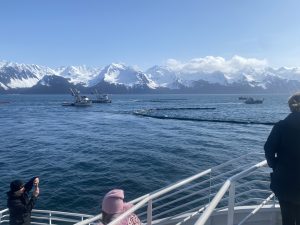 The Council held its fishing vessel oil spill response training observation tour in Seward, Alaska, on April 14, 2022. Before the COVID-19 pandemic, this had been an annual event since 2016, rotating through several communities in the region. The Seward community was invited to join the council from 11:30 a.m. to 1:30 p.m., on a Major Marine Tours vessel to observe the training.
The Council held its fishing vessel oil spill response training observation tour in Seward, Alaska, on April 14, 2022. Before the COVID-19 pandemic, this had been an annual event since 2016, rotating through several communities in the region. The Seward community was invited to join the council from 11:30 a.m. to 1:30 p.m., on a Major Marine Tours vessel to observe the training.
Seward city clerk, Brenda Ballou, stated about the event, “I’ve been aware of the SERVS training for a long time, but never had the opportunity to actually take part in it or see it. I think it’s fantastic, everybody working together. It really is a service for the whole community.”
The local fishermen participating in the training are contracted by the Ship Escort/Response Vessel System, also known as SERVS, to respond in the event of a Prince William Sound tanker or Valdez Marine Terminal oil spill. SERVS is Alyeska Pipeline Service Company’s oil spill removal organization and coordinates annual spill response exercises in multiple Southcentral Alaska communities, including Seward.
This Council event helps keep communities informed on what oil spill prevention and response measures are in place in Prince William Sound and downstream communities, especially those involving their local fishermen. Seward residents learned about oil spill response technology, tactics and how this program helps Alyeska operate safely in Prince William Sound. Narrators from both the Council and Alyeska were on board to describe the oil spill response resources and tactics used to help participants better understand the training. We would like to thank our partners, Alyeska/SERVS and Major Marine Tours, for helping to support this event.
When asked why it was important for community members to learn about this program, attendee Mead Treadwell said, “I was around during Exxon Valdez and around during the creation of the fisherman’s program. Practice like this is important. It’s an impressive drill.”
While a local 10-year-old participant noted his favorite part was seeing the “giant orange boat” [the M/V Ross Chouest utility tug], others found the key takeaway to be the reassurance the event provided them. Participant Cindy Mans noted, “I’m actually really just encouraged by what I saw and absolutely the idea that the local people have the most invested if something goes wrong. Unfortunately, I view an oil spill as more of a ‘when’ instead of an ‘if.’ If we can keep it as small as possible and the least amount of impact, this is one of the pieces to make that happen.”
Alyeska’s contracted fishing fleet is the backbone of their oil spill response system. It is essential to the system operating as it was designed to do and part of what makes the Prince William Sound system world-class. These contracted vessels and their crews help ensure the most comprehensive response measures are in place for both open water and nearshore resources. A major lesson of the Exxon Valdez spill was that incorporating local mariners into the spill response system helps ensure a quick, efficient and effective response.
Since the inception of SERVS after the Exxon Valdez oil spill, the Council has been highly supportive of local fishermen and mariners being trained annually with the best available technology to prepare for oil spills. Seward mariners have the most intimate knowledge of, and connection to, the waters near Seward. Their involvement would help protect the most sensitive areas, such as hatcheries and spawning streams, from spilled oil.
The Council has held previous fishing vessel oil spill response training tours in Whittier, Cordova and Homer. The Council hopes that through such programs communities will understand the importance of oil spill prevention and having the most robust response strategies in place in the event of a spill.
News release: